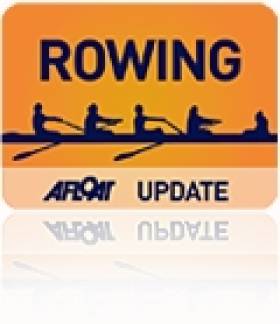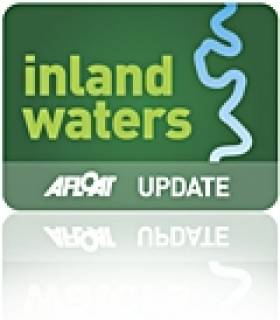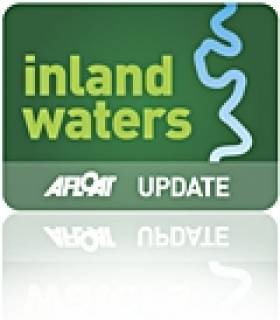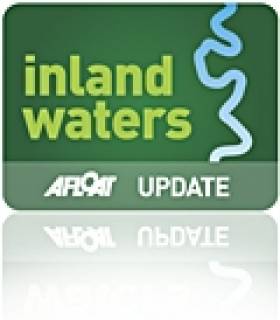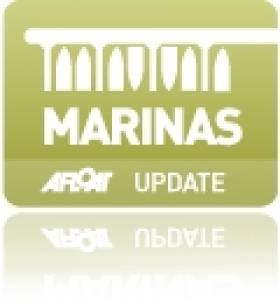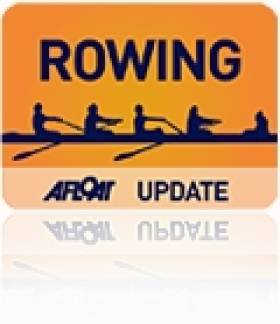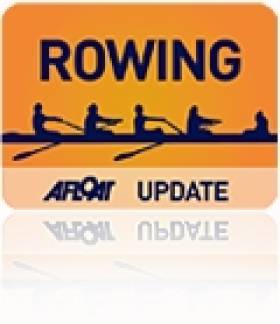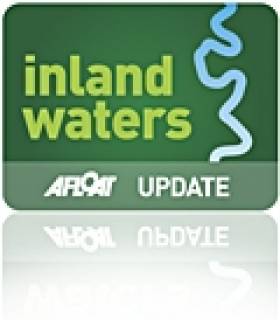Displaying items by tag: Bann
Portora Turn it up To Eleven at Athlone Regatta
#ROWING: Portora won the Stephen Doran prize for best club at Athlone Regatta on Saturday. The Enniskillen club won a remarkable 11 finals, including clean sweeps of the men’s and women’s junior 18, junior 16 and junior 15 eights – with Bann of Coleraine coming in second in the junior 18 races. Portora also won the junior men’s coxed four and junior women’s coxless four.
The men’s senior single sculls winner was Turlough Hughes of UCD, with Damien Kelly of Garda second. Conor Carmody of Shannon won the junior 18 single sculls.
Kenmare celebrated their recent affiliation to Rowing Ireland by recording their first win – in the men’s noviced coxed quadruple sculls.
Lower Bann Navigation Underwater Lock Inspections
#bann – Waterways Ireland wishes to advise masters and owners that there may be some delay when passing through locks on the Lower Bann for the next week as Waterways Ireland will be conducting underwater surveys at all locks. Users should proceed with due caution and note works signage and the instructions of lock keepers when approaching locks.
Waterways Ireland thanks its customers for their cooperation in this matter.
MARINE NOTICE
No. 92 of 2013
LOWER BANN NAVIGATION
COLERAINE
Waterways Ireland Riverfest
Sat 10th and Sun 11th Aug 2013
Waterways Ireland wishes to advise all masters and users of the Lower Bann Navigation that the above event will take place along the stretch of navigation between Coleraine Town Bridge and Mountsandel bridge in the vicinity of Christie Park moorings from 10am until 6.30pm on both days.
Masters are requested to transit this area at slow speed and with minimum wash during the event and to heed the advice and instructions of those marshalling the activities.
Waterways Ireland takes this opportunity to thank its customers for their co-operation in this matter and regrets any inconvenience caused.
C.J.Lawn
Lt Cdr (rtd)
Inspector of Navigation
18 Jul 2013
Tel: 353 90 6494232 Fax: 353 90 6494147
MN84: Lower Bann Underwater Inspection of Weir
MARINE NOTICE
No 84 of 2013
Lower Bann
Underwater Inspection of Weir
Waterways Ireland wishes to advise masters of vessels that an underwater inspection of Canroe weir will take place on Tue 9 th July and be completed on Friday 12 th July.
Masters approaching the weir should be prepared to stop short and await instructions from the dive safety officer before proceeding.
Waterways Ireland thanks its customers for their cooperation in this matter.
C.J.Lawn
Inspector of Navigation
4 Jul 2013
Tel: 353 90 6494232
Fax: 353 90 6494147
Cranagh Marina. Yacht & Boat Berths in Coleraine
Cranagh marina is located on the Bann Estuary below Coleraine, a four miles sail of the mouth of the Bann, the gateway to the North Coast from inland Ireland. It has an 18–berth jetty that is in the process of being extended to accommodate a further 60 berths.

Cranagh marina on the river Bann. Photo W M Nixon
# ROWING: Commercial topped the rankings with 11 wins and seven second places at the Neptune Head of the River at Islandbridge today. A Commercial/Neptune senior eight won the final race of the day, beating English visitors Broxbourne by half a length in three minutes 46 seconds, the fastest time of the regatta. Colm Dowling, the number seven man in the crew, had earlier won the senior single sculls title. The regatta was held in cold, sunny conditions and had a particularly big entry from Northern Ireland clubs Bann and Portora.
Neptune Regatta, Islandbridge (Selected Results)
Men, Eight – Senior: 1 Commercial/Neptune (W Yeomans, I Kelly, L Hawkes, AJ Rawlinson, F Groome, J Graham, C Dowling, M Maher; cox: G Connolly) bt Broxbourne ½ l 3:46. Intermediate: Broxbourne bt Portora 1l, 3:54. Novice: Belfast RC bt Bann 1l, 4:12. Junior 16: Portora A bt Bann 2 ¼l, 4:07. Junior 18: Neptune bt Commercial 3l, 3:59. Masters: Old Collegians/Three Castles bt Waterford BC 3l, 5:21.
Fours – Intermediate One, coxed: Portora bt Bann 1l, 4:24. Novice, coxed: Belfast bt Trinity 1¾ l, 4:52. Junior 18, coxed: Portora bt Neptune 1½ l, 4:25. Masters, coxed: Old Collegians bt Carlow 2l.
Sculling, Quadruple – Novice, coxed: UCD bt Trinity 2 ½ l, 4:32. Junior 18: Neptune bt Commercial easily 4:16. Junior 16, coxed: Commercial bt Portora 2 ½ l, 4:29. Junior 15, coxed: Portora bt Bann 1ft, 4:41.
Double – Junior 16: Waterford bt Offaly easily. Junior 15: Commercial bt Athlone A easily, 5:04.
Single – Senior: Commercial (Dowling) bt Three Castles (Corcoran) easily, 4:59. Intermediate: Garda (Kelly) bt Three Castles (Corcoran) 2 ¾ l, 4:49. Novice: UCD (Toland) bt Sligo (Patterson). Junior 18: Commercial (W Yeomans) bt Athlone (Munnelly) disq. Junior 16: Athlone (Munnelly) bt Waterford (Goff) 2 ¾ l, 4:58.
Women
Eights – Intermediate: UCD bt Commercial 2ft, 4:22. Novice: Bann bt Belfast RC easily, 4:34. Junior 16: Portora A bt Portora B easily, 4:50.
Fours – Novice, coxed: Trinity A bt Belfast B 2¾ l, 5:04.
Sculling, Quadruple – Novice, coxed: Commercial bt Neptune ¾ l, 5:21. Junior 18: Commercial bt Neptune easily, 4:54. Junior 16, coxed: Carlow bt Portora 5:04. Junior 15, coxed: Bann A bt Athlone 3½l, 5:11.
Double – Junior 16: Neptune B bt Neptune A. Junior 15: Bann bt Athlone 1l, 5:38
Single – Senior: Commercial (S Dolan) bt Commercial (E Lambe) easily, 5:32. Intermediate: Trinity (O’Brien) bt Commercial (Foley) easily, 5:27. Novice: Bann (Barry) bt Commercial (Foley) 3l, 5:25. Junior 18: Neptune (Kavanagh) bt Carlow (Byrne) ½ l, 5:36. Junior 16: Commercial (Lambe) bt New Ross (Nolan) 2ft.
Queen's and Portora Impress at Erne Head
Two men’s senior eights from Queen's University slotted into the first two slots at the Erne Rowing Head of the River at Enniskillen. The junior 18 quadruple of the host club, Portora, had a fine result, finishing joint eighth overall.
Erne Head of the River, Enniskillen
Overall: 1 Queen’s A men’s senior eight 19 minutes 53 seconds, 2 Queen’s B men’s senior eight 20:21, 3 University of Limerick/St Michael’s men’s senior eight 20:40, 4 Trinity men’s intermediate eight 20:59, 5 Bann men’s junior 18 eight 21:09, 6 Methodist College, Belfast men’s junior 18 eight 21:47.
Men, Eight – Senior: 1 Queen’s A 19:53, 2 Queen’s B 20:21, 3 University of Limerick/St Michael’s 20:40. Intermediate: Trinity 20:59. Novice: 1 Trinity 21:47, 2 Queen’s 22:38, 3 Queen’s B 24:51. Junior 18: 1 Bann 21:09, 2 Methody 21:47, 3 St Joseph’s 22:02. Junior 16: St Joseph’s 23:50. Masters: Belfast BC (E) 24:06.
Four/Quadruple Sculls – Senior: 1 Belfast RC (quadruple) 23:01, 2 LSC (quad) 24:45. Intermediate: 1 Trinity (quad) 22:17, 2 Queen’s (coxed four) 23:39, 3 University of Limerick (quad) 23:59. Junior 18: 1 Portora (quadruple) 22:02, 2 Commercial (quad) 22:51, 3 Portora (coxed four) 22:56. Junior 16: Bann (quad, coxed) 24:05.
Women, Eight – Senior: 1 Trinity 23:42, 2 NUIG 23:51. Intermediate: 1 Queen’s 23:45, 2 Trinity 26:02, 3 Methody 26:16. Novice: 1 Queen’s 25:07, 2 Trinity A 26:29, 3 Trinity B 26:40. Junior 18: 1 St Michael’s 24:41, 2 Portora A 27:24. Masters: Belfast BC (D) 25:39
Four/Quadruple – Senior: 1 Portora (quadruple) 24:32, 2 Trinity (coxed four) 27:28, 3 Garda 28:11.
Click this link for Irish Rowing detailsClick this link for the Latest Rowing News


























